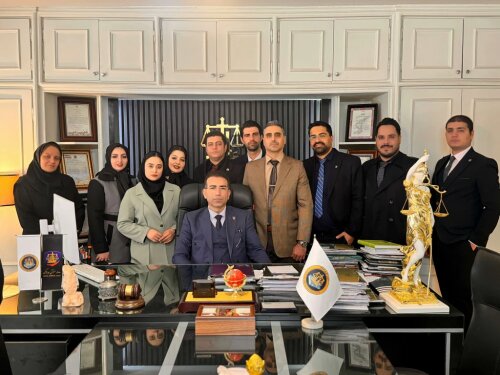Best Family Lawyers in Mashhad
Share your needs with us, get contacted by law firms.
Free. Takes 2 min.
Free Guide to Hiring a Family Lawyer
List of the best lawyers in Mashhad, Iran
About Family Law in Mashhad, Iran
Family law in Mashhad, Iran is a branch of legal practice dealing with matters such as marriage, divorce, child custody, alimony, inheritance, and guardianship. This field of law is primarily influenced by Iran's national legislation, which derives from a mix of Islamic (Sharia) principles and the country’s civil code. Due to the unique cultural and religious context of Mashhad - as one of Iran's most important cities both historically and religiously - local interpretations of family law may sometimes reflect its rich traditions as well as national standards. Understanding your rights and obligations under the law is essential whenever a family issue arises.
Why You May Need a Lawyer
Family-related legal matters can be complex, emotional, and have lasting consequences on your life and that of your loved ones. Here are some common situations in which you may require the assistance of a lawyer in Mashhad:
- You are seeking a divorce or separation and want to understand your legal options and obligations.
- You need to resolve issues related to child custody, visitation rights, or child support.
- You need assistance formalizing or contesting a marriage, such as documenting marriage contracts (Nikah).
- You are dealing with domestic violence and require protection or legal recourse.
- You are involved in inheritance disputes or require assistance with succession planning according to Islamic and Iranian law.
- You want to draft legal agreements such as prenuptial contracts or property ownership documents.
- You are a foreign national married to an Iranian citizen seeking to understand your legal rights and obligations.
Local Laws Overview
Family law in Mashhad is governed by the Iranian Civil Code and related statutes, which include provisions specific to marriage, divorce, custody, and inheritance. The following are some key aspects of local family laws you should be aware of:
- Marriage: Marriage contracts must comply with religious and civil requirements. Minimum age and consent of both parties are necessary.
- Divorce: Both men and women can request a divorce, though the process and requirements may differ. Specific grounds must often be demonstrated, especially for women seeking divorce.
- Child Custody: Custody is determined based on the best interests of the child, with usual preference given to mothers until the child reaches a certain age, after which custody may be revisited.
- Alimony: The law recognizes the right to spousal and child support, calculated based on earnings and needs.
- Inheritance: Distribution of assets follows Islamic inheritance rules, with fixed shares for family members.
- Guardianship: Decisions affecting children require special judicial approval, particularly in cases where both parents are not present.
- Domestic Violence: Protective measures and legal remedies are available, though involving the authorities and courts is sometimes necessary to ensure safety.
Frequently Asked Questions
What is required to get legally married in Mashhad?
To legally marry, both parties must meet the minimum age requirement, have capacity and mutual consent, and register the marriage at an official registry office. Religious ceremonies are customary, but civil registration is mandatory for legal validity.
Can women file for divorce in Mashhad?
Yes, women can file for divorce but must usually provide legal grounds, such as harm or neglect. The process may be more involved than for men, so legal support is often recommended.
How is child custody decided after divorce?
Initial custody is typically granted to mothers for sons up to age 7 and daughters up to age 9. After these ages, custody can transfer to the father unless the court decides otherwise based on the child's welfare.
Is a prenuptial agreement legally recognized?
Yes, prenuptial agreements specifying dower or other marital terms are recognized if documented properly at the time of marriage and meet the requirements of Iranian law.
How is inheritance divided among family members?
Inheritance follows fixed Islamic shares, with specific portions allotted to children, spouses, and parents. The details depend on the composition of the surviving family.
What legal steps can be taken in cases of domestic violence?
Victims may apply for protection orders, file criminal complaints, and seek assistance from relevant legal or governmental bodies. Legal representation can help navigate the process and ensure safety.
Can international couples get married or divorced in Mashhad?
Foreign nationals can marry or divorce in Mashhad, but additional documentation may be required, such as proof of legal capacity to marry or recognition of foreign divorce decrees.
What rights does a child born out of wedlock have?
Children born out of wedlock are entitled to support, inheritance, and recognition, though certain formalities are required for legal documentation. Paternity may need to be established through the courts.
How is child support calculated?
Child support amounts are determined by the court, taking into account the income and financial abilities of the parent as well as the needs of the child.
What role do family courts play in resolving disputes?
Family courts handle cases related to divorce, child custody, alimony, inheritance, and other family matters. Their decisions are legally binding, and procedures are governed by the Iranian judiciary.
Additional Resources
If you need further information or support regarding family law issues in Mashhad, the following resources may be helpful:
- Provincial Court of Justice in Mashhad (Dadgostari)
- Family Court (Dadgah Khanevadeh) offices in Mashhad
- The Organization for the Registration of Deeds and Properties (Sabt Ahval) for marriage, divorce, and birth registrations
- Legal Aid Centers (Markaz Komak Hoghoughi) for individuals in need of financial assistance
- Local attorneys specializing in family law
- Governmental Social Services and Counseling Centers
Next Steps
If you or someone you know requires legal assistance in a family law matter in Mashhad, consider taking the following steps:
- Gather all relevant documents such as marriage certificates, birth records, and any existing legal agreements.
- Consult with a qualified family law attorney or legal aid provider who can review your case and explain your rights and options.
- Visit the appropriate governmental or judicial offices for documentation, registration, or to file petitions.
- If immediate safety is a concern, contact local authorities or a crisis center for protection.
- Proceed with legal proceedings under the guidance of an attorney to ensure compliance with all local laws and proper representation of your interests.
Taking these steps with the guidance of a knowledgeable legal professional will help you navigate the complexities of family law in Mashhad and protect your rights and those of your family members.
Lawzana helps you find the best lawyers and law firms in Mashhad through a curated and pre-screened list of qualified legal professionals. Our platform offers rankings and detailed profiles of attorneys and law firms, allowing you to compare based on practice areas, including Family, experience, and client feedback.
Each profile includes a description of the firm's areas of practice, client reviews, team members and partners, year of establishment, spoken languages, office locations, contact information, social media presence, and any published articles or resources. Most firms on our platform speak English and are experienced in both local and international legal matters.
Get a quote from top-rated law firms in Mashhad, Iran — quickly, securely, and without unnecessary hassle.
Disclaimer:
The information provided on this page is for general informational purposes only and does not constitute legal advice. While we strive to ensure the accuracy and relevance of the content, legal information may change over time, and interpretations of the law can vary. You should always consult with a qualified legal professional for advice specific to your situation.
We disclaim all liability for actions taken or not taken based on the content of this page. If you believe any information is incorrect or outdated, please contact us, and we will review and update it where appropriate.
Browse family law firms by service in Mashhad, Iran
Mashhad, Iran Attorneys in related practice areas.










